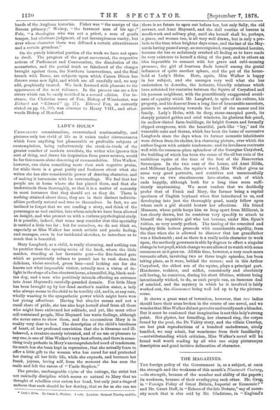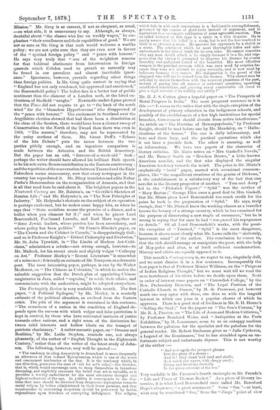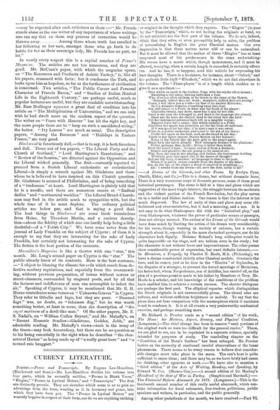THE MAGAZINES.
THE foreign policy of the Government is, as a subject, at once the strength and the weakness of this month's Nineteenth Century, —its strength, because of the number and ability of the papers ; its weakness, because of their overlapping each other. Mr. Greg, in "Foreign Policy of Great Britain, Imperial or Economic?" and Mr. Grant Duff, in "Echoes of the late Debate," say of neces- sity much that is also said by Mr. Gladstone, in "England's Mission." Mr. Greg is as earnest, if not as eloquent, as usual, —on what side, it is unnecessary to say. Although, as always, doubtful about "the classes who live on weekly wages," he em- phasises "their excellences and their capabilities of good." We are not so sure as Mr. Greg is that such would welcome a warlike policy ; we are not ciaite sure that they are even now in favour of the " spirited foreign policy" and "peace with honour." He says very truly that " one of the weightiest reasons for that habitual abstinence from intervention in foreign quarrels which Cobden used to preach so earnestly may be found in our prevalent and almost inevitable ignor- ance." Ignorance, however, prevails regarding other things than foreign politics. Is Mr. Greg quite correct in saying that England has not only condoned, but approved and sanctioned," the Beaconsfield policy? The ballot-box is a better test of public sentiment than the clamour of a London mob, or the hired en-
thusiasm of Sheffield "roughs." Newcastle-under-Lyme proved that the Times did not require to go to "the back of the north wind" for the "blameless Hyperboreans " who disapproved of
the "peace with honour." The excitement in Scotland over the Argyllshire election showed that had there been a dissolution at the close of the Session, there would have been a cleaner sweep of Conservatism to the North of the Tweed than there was even in 1868. "The masses," therefore, may not be represented by the noisy sections of them. Mr. Grant Duff's "Echoes of the late Debate" puts the issues between the two parties pithily enough, and an ingenious comparison is made between the Athenian and the British democracy. But the paper has an odd, " fervour-of-a-week-old " look ; perhaps the writer should have allowed his brilliant Bath speech to be his sole extra-Recess contribution to the Eastern controversy ; and the repetition of the conversation between Tancred and the Emir Fakredeen seems unnecessary, now that every newspaper in the country has reproduced it. Mr. Dicey translates and edits Nubar Pasha's Memorandum on the reorganisation of Armenia, and that
is all that need here be said about it. The brightest papers in the Nineteenth Century are Mr. Ralston's, on " Gr6ville's Sketches of Russian Life ;" and Mr. Holyoake's, on "The New Principles of Industry." Mr. Holyoake's rhetoric on the subject of co-operation is perhaps exuberant, but he makes some happy hits, as when he
says that "State socialism means the promise of a dinner, and a bullet when you clamour for it ;" and when he places Lord Beaconsfield, Ferdinand Lassalle, and Karl Marx together as "three Jewish leaders, whose passion has been ascendancy, and whose policy has been politics." Sir Francis Hincks's paper, on "The Crown and the Cabinet in Canada," is disappointingly dull ; and so is Professor Knight's "Ethical Philosophy and Evolution." Mr. St. John Tyrwhitt, in "The Limits of Modern Art-Criti- cisms," administers a rebuke—not strong enough, however—to Mr. Mallock, for his recent crude and slightly vulgar "Colloquy on Art." Professor Morley's "Recent Literature "is somewhat of a misnomer; it is really an estimate of Mr. Tennyson as a dramatic poet. The most interesting paper, perhaps, is one by Sir Walter Medhurst, on "The Chinese as Colonists," in which he makes the valuable suggestion that the Dutch plan of appointing Chinese magistrates in Java, called "captains," to settle their affairs, and communicate with the authorities, might be adopted everywhere.
The Fortnightly Review is very readable this month. The first paper, "A Political Epilogue," by Mr. Morley, is a masterly estimate of the political situation, as evolved from the Eastern
crisis. The pith of the argument is contained in this sentence, "The soundness of a nation in the condition of England de- pends upon the success with which vulgar and false patriotism is kept in control, by those who have cultivated instincts of justice towards other nations, and a right sense of the distinction be- tween solid interests and hollow blasts on the trumpet of patriotic charlatanry." A rather sarcastic paper, on " Dreams and Realities," by Mr. Leslie Stephen, reminds one, not always pleasantly, of the author of "English Thought in the Eighteenth Century," rather than of the writer of the latest study of John- son. The following, however, may well be quoted :—
" The tendency to cling desperately to dreamland is more frequently an utterance of that refined Epicureanism which is one of the worst and commonest tendencies of the day. It is the tendency which, in one direction, generates the cant of art for art's sake,'—the doctrine, that is, which would encourage men to steep themselves in luxurious dreaming, and explicitly renounce the belief that art is valuable, as it provides a worthy embodiment for the most strenuous thought and highest endeavour of the age. In politics it corresponds to the doc- trine that men should be diverted from dangerous aspirations towards social reform by bribes administered to their lower passions, and that acquiescence in enervating despotism should be preserved by lavish expenditure upon frivolous or corrupting indulgence. The religion which falls in with such conceptions is a fashionable accomplishment, governed by the canons of good-taste instead of argument, and is equivalent to a systematic cultivation of some agreeable emotion. The so-called believer of this type is a cynic in a thin disguise. He is partly aware that Lis belief is a sham, but is not the less resolved to stick to so pleasant a sham. He answers his opponents by a shriek or a sneer. The sentiment which ho most thoroughly hates and mis- understands is the love of truth for its own sake. He cannot conceive why any man should atfack a lie simply because it is a lie, and sup- poses that the enemy is prompted to disperse his dreams by coarse brutality and malignant hstred of the beautiful. His most effective weapon is the petulant sarcasm which was once used by sceptics be- cause they were not allowed to argue seriously, and is now used by believers because they cannot. His indignation is the growl of the sluggard who will not be roused from his dreams. Why cannot men bet satisfied to amuse themselves with the reverent phantoms of the past, instead of prying into all manner of awkward questions, upsetting established convictions, and pressing every comfortable old creed to give a rigid account of its validity and utility ?"
Mr. II. j. S. Cotton gives a hopeful paper on "The Prospects of Moral Progress in India." The most pregnant sentence in it is this It seems to the writer that with the single exception of the development of primary education in the indigenous schools, and possibly of the establishment of a few high institutions for special branches, Government should abstain from active interference." Au article on "The Doctrine of Metempsychosis," by Professor Knight, should be read before one by Mr. Maudsley, on " Hallu- cinations of the Senses." The one is dully informatory, and here and there hazy, and the poetical quotations which eke it out have a juvenile look. The other is amusing, as well as informatory. We have two papers of the character of literary criticism. Mr. Miuto writes on " Mrs. Gaskell's Novels," and Mr. Barnett Smith on " Brocken Brown," a little-known American novelist, and the first who displayed the singular American tendency towards the weird. The point in Mr. Minto's emphatically " lucid " paper, marred with occasional common- places, like "the magnificent creations of the genius of Dickens,' is the establishment in a satisfactory way of the fact that one novelist is the literary progenitor of another. "Tom and Jerry led to the "Pickwick Papers ;" " Sybil " was the mother of "Mary Barton ;" George Eliot owes a good deal to Mrs. Gaskell. But Mr. Minto gives Lord Beaconsfield too much credit for the pains he took in the preparation of "Sybil." He says, truly enough, that" Mr. Disraeli knew the working-classes as a traveller knows the botany of a strange country, which lie has examined for the purpose of discovering a new staple of commerce," but he is wrong in saying that for once he had "conquered his repugnance to details." Of all Lord Beaconsfield's works, with the possi- ble exception of " Tancred," " Sybil " is the most dangerous, because it shows most clearly what Mr. Lowe calls the "slatternly, inaccurate mind" of the author. The conclusion he comes to, that the rich should manage or manipulate the poor, with the help of May-poles and alms, is of itself sufficient condemnation. History and ethics are equally opposed to it.
This mouth's Contemporary is, we regret to say, singularly dull, and we must dismiss it in a few sentences. Incomparably the best paper is that of Professor Monier Williams, on the "Progress of Indian Religious Thought," but we must wait till we read the next instalment of his views before we decide upon them. Next
in order of interest come papers on " Cavendish College," by the Rev. Prebendary Brereton, and "The Legal Position of the Catholic Church in France," by M. de Pressense, yet however much one may agree with them, one does so with the languid interest in which one joins in a popular chorus of which he
approves. There is a good deal of liveliness in Mr. R. IL Home's "Selling the Soul ;" but the papers on "The Sun's Corona," by Mr. It. A. Proctor, on "Time Life of Jesus and Modern Criticism," by Professor Bernhard Weiss, and "Antiquities at the Paris Exhibition," by M. Lenormant, seem to us an unhappy medium between the pabulum for the specialist and the pabulum for the general reader. Mr. Robert Buchanan gives us "Julia Cytherea, a Legend of the Renaissance," but he has stumbled upon an un- fortunate subject and unfortunate rhymes. This is not worthy
of the author :—
"And now again the prospect gleams
Into the glory of a dream ; And lo! they stand 'mid sand and shells,
And watch the waves, with sleepy swell,
Rising and breaking drowsily
In the green crescent of the sea."
Very readable is Mr. Freeman's fourth onslaught on Mr. Froude's "Life and Times of Thomas Becket." As a piece of literary in- vective, it is what Lord Beaeonsfield once called Mr. Beresford Hope's eloquence, "a great armament." Some "fun "—at least, what may be considered "fun," from the " Jingo " point of view —may be expected after such criticisms as these Mr. Froude stands alone as the one writer of any importance of whose writings one can say that on them any process of correction would be thrown away Among those whom truth has enrolled in her following as her men, amongst those who go forth to do battle for her as their sovereign lady, Mr. Froude has no part, no lot."
In nearly every respect this is a capital number of Fraser's Ma gaz;ne. The articles are not too numerous, and they are good. Mr. McCoan's paper, with which the magazine opens, on "The Resources and Products of Asiatic Turkey," is, like all his papers, crammed with facts ; but it condemns the Turk, and looks upon him as hopeless, so far as the furtherance of civilisation is concerned. Two articles, "The Public Career and Personal Character of Francis Bacon," and "Studies of Italian Musical Life in the Eighteenth Century," are perhaps useful, much as popular lectures are useful, but they are readable notwithstanding. Mr. Bass Mullinger squeezes a great deal of erudition into his article on "The Multiplication of Universities," and we can only wish he had dwelt more on the modern aspect of the question. The writer on "Peace with Honour" has hit the right key, and the more people there are to "harp on such a mauldered string," the better. "Ivy Leaves" are much as usual. The descriptive papers, "Among the Burmese" and "Holidays in Eastern France," are very good.
Blackwood.is ferociously dull,—that is to say, it is both ferocious and dull. Three out of ten papers, "The Liberal Party and the Church of Scotland," "Lord Hartington's Resolutions," and "Review of the Session," are directed against the Opposition and the Liberal wicked generally. The first—currently reported to proceed from a Scotch Liberal ecclesiastic or ecclesiastical Liberal—is simply a screech against Mr. Gladstone and those whom he is believed to have inspired on this Church question. Mr. Gladstone is accused of Philistinism, and of being something of a " tradesman " at heart. Lord Hartington is plainly told that he is a noodle, and there are numerous sneers at "Radical dailies "and "sentimental weeklies." The Liberal Broad-Church- man may find in the article much to sympathise with, but the whole tone of it he must deplore. The ordinary political articles are below par, and that is saying a good deal. The best things in Blackwood are some fresh translations from Heine, by Theodore Martin, and a curious descrip- tion—about the fidelity of which one can hardly help being a little doubtful—of a " Fetish City." We have some notes from the journal of Lady Franklin on the subject of Cyprus ; of them it is enough to say that they are interesting for the sake of Lady Franklin, but certainly not interesting for the sake of Cyprus. The fiction is the best portion of the contents.
Macmillan's Magazine is like a theatre with one "star," this month. Mr. Lang's second paper on Cyprus is the " star." The public already know of its contents. Here is the best sentence, —"I object to blaming the climate for evils which result from de- fective sanitary regulations, and especially from the overcrowd- ing, without previous preparation, of towns without sewers or street-cleansers, surrounded by stagnant pools, and by all that the laziness and indifference of man can accomplish to infect the air," Speaking of Cyprus, it may be mentioned that Mr. R. H. Horne contributes some verses on "Unknown Graves" in Cyprus. They refer to Othello and Iago, but they are poor. "Damned Iago " was, no doubt, an "inhuman dog," but he was worth something better, at least in verse, than the description of "the caput mortuum of a devil-like man." Of the other papers, Mr. E. S. Nadal's, on "William Cullen Bryant," and Mr. Mahaffy's, on "Recent Homeric Studies—Gladstone, Geddes, Jebb," are admirable reading. Mr. Mahaffy's views—such is the irony of the times—may look heterodoxy, but there can be no question as to his being essentially in the right when he describes "the char. acter of Hector" as being made up of "a really great hero" and "a second-rate braggart."
































 Previous page
Previous page